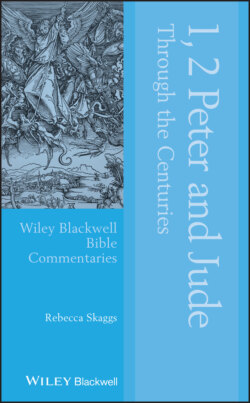Читать книгу 1, 2 Peter and Jude Through the Centuries - Rebecca Skaggs - Страница 29
Other Interpretations
ОглавлениеSeveral churches use these verses in their confessional or catechetical statements. For example, the Heidelberg Catechism (1563) is not concerned with the location of the future inheritance, but focuses on the means by which it is attained (Pelikan II, VI: 437). The Westminster Confession of Faith (1647) is similar; while omitting some details of v.4, it declares that we are “heirs of everlasting salvation” (ibid.: 622). The Second Vatican Council likewise expresses hope for a future place in heaven: “the church … serves all humanity … as it makes its pilgrim way toward the homeland which is its goal” (Pelikan III, V: 637).
The Confessional Statement of the United Presbyterian Church (1925) is more expansive:
We believe in … the consummation and bliss of the life everlasting, wherein the people of God, freed from sin and sorrow, shall receive their inheritance of glory in the kingdom of their Father, and with capacities and powers exalted and enlarged, shall be made fully blessed in the fellowship of Christ, in the perfected communion of saints, and in the service of God, whom they shall enjoy forever and ever. (Pelikan III, V: 69)
Modern scholars have been intrigued by various concepts such as “hope” and “being kept.” For example, Green (2007: 43) posits that Peter’s hope “presumes transformed ways of thinking and is clearly set within an eschatological horizon.” Another current scholar Michaels highlights the term “kept” and shows its significance for understanding the inheritance. The word “kept” is a passive participle indicating God’s action in preserving the inheritance for the chosen. The perfect tense of this participle suggests that God’s action had its beginning in the past (God’s foreknowledge, v.2a). The idea of something being “kept” or hidden in God can be found in Jewish apocalyptic literature (for references from such, see Michaels, 1988: 21). The idea is that something precious is being protected by God himself for the end‐time. Paul uses a similar concept (e.g. Rom. 8:17; Gal. 4:7), except that for him the hidden things have been revealed in the present in Christ, whereas for Peter they will be revealed in the future. This entire section is mainly one of triumphant hope for the world to come (for like‐minded thinking, see 2 Peter and Jude, where the wicked are “kept” for judgment (Jude 6; 2 Pet. 2:4, 9; 3:7). Also, in contrast, judgment is “kept” or “reserved” for the wicked in Jude 13 and 2 Peter 2:17.
It does not become clear until later in the passage (vv.6–9) that the believers are being protected during “trials”: they are “kept” “by the power of God through faith.” It also emerges that this protection is not eradication of the trials; rather, God, being the initiator of these, “preserves” the faith of those undergoing them.
